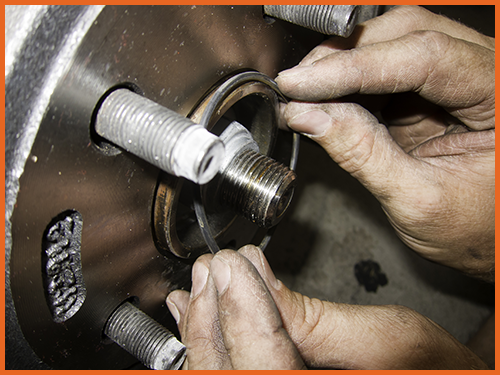Your brakes are one of the most important components of your car—both mechanically and when it comes to safety. They are often your first line of defense in preventing an accident. So, if your brakes start going bad, you need to pay attention.
Read on below to learn more about brakes from DamagedCars.
What Are Your Brakes?
Brakes are a mechanical component of your vehicle responsible for slowing down and stopping the moving car. They utilize friction to slow and stop the motion.
Anti-Lock Braking System (ABS)
The anti-lock braking system, or ABS, is a safety feature equipped in modern vehicles. It prevents your wheels from locking up and skidding during abrupt stops. This way, you retain control of your car even during emergencies.
Brake System Components
Master Cylinder and Power Brake Booster
The master cylinder acts as a kind of plunger in the brake system when it is activated by the brake pedal. This component houses brake fluid and when activated, forces the fluid through the brake lines to press the brake pads against the rotors and slow the car down. It does all this by converting force into hydraulic pressure.
Some cars are equipped with a power brake booster which works to amplify the master cylinder and improve braking performance. Most brake boosters are powered by a vacuum mechanism located between the brake pedal and the master cylinder.
Rotor
Rotors are attached directly to vehicle wheels and spin at the same rate as the wheels. They are what the brake pads rub against when you press the brake pedal to slow down your car. They are typically made of cast-iron with vents or vanes to help with cooling.
Brake Pads
Brake pads are the part of the braking system that rubs against the drums or rotors. They are attached to calipers and create friction when pressed against the rotors.
Brake Shoes
Brake shoes are an alternative to brake pads. Shoes have the same function as brake pads but instead of rubbing against a rotor, they rub against the inside of the brake drum to slow down your car.
Brake Drum
A brake drum is an alternative to a rotor in a drum brake system. Just like a rotor, a brake drum is paired with the car’s wheels and rotates at the same rate as the wheel. Unlike a rotor, though, a brake drum is a hollow, cylindrical, cast iron container that contains brake shoes inside.
Caliper and Caliper Bracket
Calipers provide the clamping force necessary for brake pads to rub against the brake rotor. This is the part that your brake lines are connected to. When you press the brake pedal, the hydraulic pressure created by the master cylinder forces the pistons on the calipers to clamp down on the brake rotor and slow the car.
The caliper bracket mounts the caliper onto the wheel and helps to keep it and the brake pads aligned.
Wheel Cylinder
A wheel cylinder is part of a drum brake system (as opposed to a disc or rotor brake system). It is found at the top of the while inside the drum brake. It operates much like calipers in that it pushes brake shoes outward toward the brake drum to create friction.
Our expert evaluators can help you get an accurate estimate for your cars value, FAST!

How Can You Tell Your Brakes Are Going Out?
Constant use of your brakes might make it easier for you to tell when they start going bad. Brakes usually have obvious signs of damage or wear.
Here are the most common signs of bad brakes:
It takes longer to stop: This sign indicates that your brake pads or shoes are worn-out and need to be replaced.
You hear grinding or squealing when braking: These sounds convey worn out brake pads, but they can also signal that dirt, grime, moisture, or debris is affecting your brakes.
The brake pedal feels soft or “spongy”: Issues within the master cylinder or air in the brake system can cause your brakes to “feel soft.”
Your car is pulling to one side when you brake: This can be a sign that one of your calipers or brake pads is more worn out than the others. It can also indicate a brake hose issue.
There is brake fluid under your car: Seeing fluid under your car can indicate a leak, crack, or hole along your brake lines or the master cylinder itself. Without this fluid, you won’t be able to brake.
How Many Years Do Brakes Last?
The lifespan of brakes is most often estimated by mileage rather than years. Depending on your exact vehicle and driving habits, your brakes can last anywhere between 30,000 miles and 70,000 miles.
Although the average driver accumulates about 12,000 miles per year, giving you between three and six years before needing to change your brakes, your driving habits can affect that estimate.
How Much Does It Cost To Repair Brakes?
Brake repair costs vary by service. The most common brake service is brake pad replacement. This service typically costs between $350 and $450 for parts and labor combined.
Because the brake system consists of many other parts, there are many other components that might need repair or replacement. Here are the estimated repair costs for different brake parts:
| Service | Price |
|---|---|
|
Brake rotor replacement |
$50-$150 per rotor |
|
Brake caliper replacement |
$100-$175 per caliper |
|
Total brake system replacement |
$1,500 - $3,000 |
|
Master cylinder replacement |
$200-$300 |
If your automobile needs several brake repairs, then you’ll have to factor in different part costs including brake rotor costs, brake pad costs, and brake fluid costs. Even if paying $50 for a rotor doesn’t seem too bad, the cost for multiple parts can quickly add up.
Who Buys Cars With Broken Brakes?
Are your brakes past the point of repair? Maybe the repairs are simply too costly.
DamagedCars is happy to purchase your vehicle with its broken brakes. We specialize in buying damaged cars of all sorts, including those with brakes that have seen better days.
We can offer you a fair quote in less than two minutes and get your car off your lawn in less than 48 hours. This is how:
You answer a few quick questions about your vehicle and get an offer.
We help you schedule your free pickup and payment if you accept the offer.
A driver arrives to pick up your car in less than 48 hours and hands you your check.
It is that simple to sell your broken car when you work with DamagedCars. Get an offer today!



